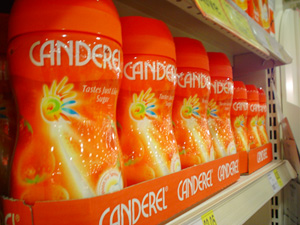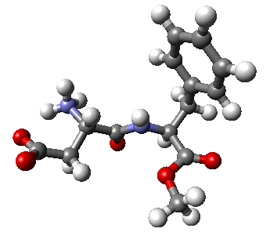|
For
the past 25 years, scientists and public groups have been warring
over the safety of the sweetener aspartame.
by Katherine Nightingale
 Photo courtesy
of Katherine Nightingale
Photo courtesy
of Katherine Nightingale
Aspartame is commonly marketed as the sweetener Canderel.
|
|
The modern world seems full of foods and products that we should either avoid or ingest with enthusiasm. We should drink green tea and eat tomatoes for their antioxidants. Saturated fat, soft drinks and alcohol (unless it's red wine) are to be avoided. Every now and again a new foodstuff, additive or drug comes onto the market and thrusts us onto a battlefield of warring scientists, doctors and public groups. Results of safety tests are hotly contested, small doubts sensationalised into a big deal and a queue of sufferers comes forward to denounce the particular product that has failed them. Highlighting this is the case of aspartame, the artificial sweetener marketed as NutraSweet or Canderel, which has been the subject of such debate for 25 years. Is it a poison approved because of a suspicious conflict of interest or a harmless sugar replacement helping to reduce our calorie intake?
Aspartame is a protein sweetener that is used widely as a replacement for sugar in diet soft drinks and desserts. It was discovered accidentally by the scientist James M Schlatter in 1965. Schlatter was testing anti-gastric ulcer drugs with a tetrapeptide - a protein made up of four amino acids - that breaks down to an intermediate dipeptide. It was this dipeptide - aspartame - that Schlatter tasted when he later licked his finger. Aspartame was found to be 180 times sweeter than sugar at the same concentration and since the same sweetness can be achieved with far fewer calories, it is often marketed as the healthy choice.
 Photo
courtesy of Dr Eric Walters
Photo
courtesy of Dr Eric Walters
The chemical structure of aspartame.
|
But it wasn't until 1981 that aspartame was approved by the U.S. Food and Drug Administration (FDA). This coincided with Ronald Reagan's inauguration as president and the appointment of his friend Arthur Hull Hayes as the head of the FDA. Many people considered this to be a conflict of interest and accused Hayes of ignoring scientists who were concerned that aspartame could cause cancer in rats.
Approval by the FDA was swiftly followed by licensing in many other countries, but even today the debate still rages on. As recently as November 2005, research has been published claiming to have proved a link between aspartame and lymphoma in rats, although many think that such studies are given an unnecessarily loud voice in the public sphere. In 2004, a paper in the British Medical Journal stated that the sweetener had been unfairly demonised in sections of the press and several websites. According to Dr Eric Walters of the Rosalind Franklin University of Medicine and Science in Chicago, the criticisms can never attract the kind of headlines that such an alarmist proclamation gets.
Anti-aspartame websites have waged
a campaign against aspartame and link it to over 92 health conditions,
including multiple sclerosis, epilepsy and lupus. Concern stems
from the fact that when digested, aspartame breaks down into methanol
and its two constituent amino acids: aspartic acid and phenylalanine.
Each of these has been suggested to have a detrimental effect on
health, yet both aspartic acid and phenylalanine are naturally found
in foods and methanol is a natural by-product of human metabolism
often used in the production of alcoholic drinks and fruit juices.
Most of the debate centres around the concentrations of these
products when aspartame is digested, but most scientists believe
that aspartame does not provide high enough levels of any of these
chemicals to cause concern. "It's hard to imagine a safer sweetener
than aspartame," says Dr Walters, "It's rapidly broken down into
substances which are part of any normal diet, and the metabolism
of those substances is extremely well understood."
Studies investigating the effect of aspartame on humans have also agreed that it is safe. For aspartame to have adverse effects on the brains of primates, around 25 times the recommended daily dosage would have to be consumed and even random high dosage trials in humans have shown no adverse effects at all. Dr Walters claims that the aspartame controversy is part of a general phenomenon. "Every study that suggests a relationship between diet and health gets a headline in the newspaper and a sound bite on the evening news. People see the headline but can't look at the details of each study," he says.
So while the scientists battle it out, what are we to do? On its website, the American FDA states that to date, they have not determined any consistent pattern of symptoms that can be attributed to the use of aspartame, nor is the agency aware of any recent studies that clearly show safety problems. Perhaps for the moment we must trust the scientific majority and watch out for the hype.
For more info, visit:
U.S. Food and Drug Administration - Sugar Substitutes
http://www.fda.gov/fdac/features/1999/699_sugar.html
Professor Eric Walters - Dept. of Biochemistry & Molecular Biology, Rosalind Franklin University of Medicine and Science
http://www.rosalindfranklin.edu/cms/biochem/walters.html
|
